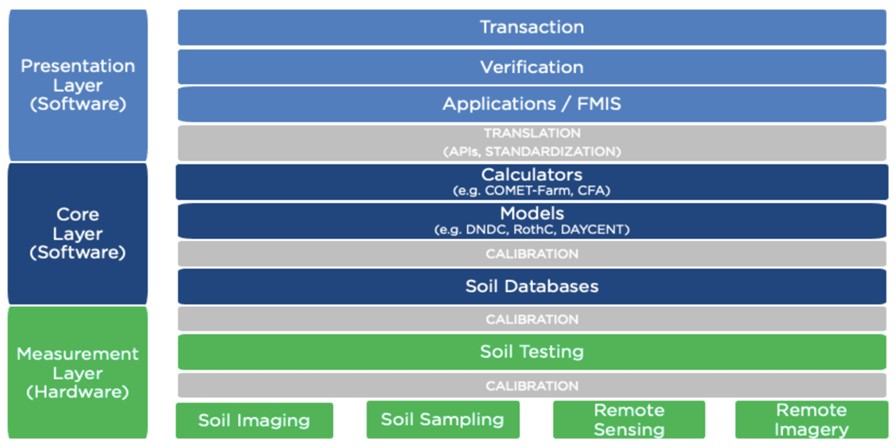Blog
Fixing the Soil Health Tech Stack
Recorded conference session may be accessed on the Farm Foundation YouTube channel.
Fixing the Soil Health Tech Stack: Gathering for Action was a two-day virtual conference taking place August 23-24, 2022. It was comprised of three interwoven activities: a soil sampling campaign, a soil data hack, and the “Fixing the Soil Health Tech Stack” virtual conference.
The “Soil Health Tech Stack” is a term coined by Seana Day in an article that outlines the challenges she sees based on, among other things, her work co-authoring the USFRA Transformative Investment report about how technology and finance could scale climate smart, soil-centric agriculture practices as well as on information gathered during the Farm Foundation Regenerative Ranching Data Round Up. The “Fixing the Soil Health Tech Stack” activities will build upon those efforts and others. As such, the event will leverage pasture/rangeland data but with the goal of extending solutions to all soil-based agriculture production ecosystems.

Three Components of the Soil Health Stack Conference
Preceding the August conference was an intense “Soil Data Sampling Campaign” that developed a robust data set for a “Soil Data Hack” that ran concurrently with the August conference.
The Soil Sampling Campaign
Starting in mid-May, a robust soil sampling effort occured at TomKat Ranch, an 1800-acre regenerative cattle ranch in Pescadero, California. TomKat Ranch collects ecological data on the ranch by participating in Point Blue Conservation Science’s Rangeland Monitoring Network, including soil tests across the ranch starting in 2014. These data are publicly available as part of the TomKat Ranch Data Project.
Point Blue Conservation Science, along with non-profit The Soil Inventory Project collected approximately 1,800 soil samples that then had soil carbon percentage and bulk density analyzed by three different soil labs to create a robust data layer across five pastures where TomKat has applied treatment regimes. The soil sampling campaign used different measurement methods to account for and detect carbon and bulk density in the soils in these pastures.
The aim of having different tools analyzing similar soil samples across pastures was to help to describe the accuracy and cost of different soil analysis measurement and mapping tools and the variance that occurs between methods.
The Soil Data Hack
By the beginning of August, the Purdue Open Agriculture Technology Systems (OATS) Center took the data results from the Soil Sampling Campaign to create a publicly available data set that served as the data foundation for the Soil Data Hack that took place during the “Fixing the Healthy Soils Tech Stack” conference August 23-24.
The Soil Data Hack was designed to make tangible progress toward fixing the soil health tech stack immediately by having participating developers create open source code to help with the transfer and presentation of soil-related data in a common medium through a hackathon-style over a two-day period. The conference and hackathon ran in parallel, with opportunities for report-outs by hackathon participants during the meeting. The results of that work will help to form the foundation of soil health data interoperability.
Fixing the Soil Health Tech Stack Virtual Conference
The virtual conference was four hours long on both Tuesday, August 23rd and Wednesday, August 24th. The broad arc of the conference topics included an overview of the soil data hack, understanding the concept of the soil health tech stack, and how to fix the soil health tech stack.
A post-conference summary will be published by Farm Foundation and shared with meeting participants.
These activities are being led by Farm Foundation in partnership with The Mixing Bowl, The Soil Health Institute, Point Blue Conservation Science, the Purdue Open Ag Technology & Systems Center, Semios, The Soil Inventory Project, and the TomKat Ranch Educational Foundation.
